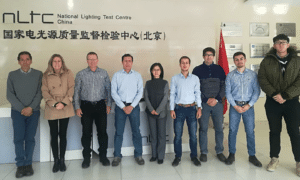
One of the cheapest and fastest ways to reduce global carbon emissions and air pollution is the phase-out of inefficient lighting technologies. Electricity for lighting accounts for 15 per cent of global power consumption.
But as for many other countries, lighting compliance testing is a challenge for Chile. Current testing laboratory capacity in the country is limited and in need of an upgrade.
Compliance testing is a fundamental component of energy-efficient lighting policies with which products’ safety and energy efficiency claims can be verified. Without such on-going market control activities non-compliant lamps enter markets, disappointing users and reducing electricity savings.
As part of the United for Efficiency’s work in Chile, six Chilean lighting experts representing a technological do tank ‘Fundación Chile’, Center for the Study of Measurement and Quality Certification, and electricity and fuel safety service provider ‘Superintendencia de Electricidad y Combustibles’ attended the week-long training in China.
“Enhancement of technical capacity of the Chilean quality control institutions and stakeholders facilitates the implementation and the effectiveness of compliance control. This ensures consumers can buy high quality, energy-efficient lamps,” says Ms. Jing Wang, Project Manager of the Global Efficient Lighting Centre.
“The training has strengthened the technical capacities of Chilean government and private laboratory organisations,” says Cristian Baeza of Superintendencia de Electricidad y Combustibles, one of the participants.
“By understanding the lighting certification and market surveillance processes in place in China, the world’s largest lamp manufacturer, we can identify possible aspects of improvement in Chile. I really recommend the training to other countries as it allows a significant transfer of knowledge between countries”.
The Global Efficient Lighting Centre promotes the rapid development of energy-efficient lighting technologies around the world. It was launched in 2012 as a partnership between UN Environment and the National Lighting Test Centre of China. Since then, the Centre has provided lighting testing and quality control training to over 800 experts from developing and emerging countries, including from Peru.